A first for the Donald: Trump says he regrets hurtful comments he’s made in heat of debate
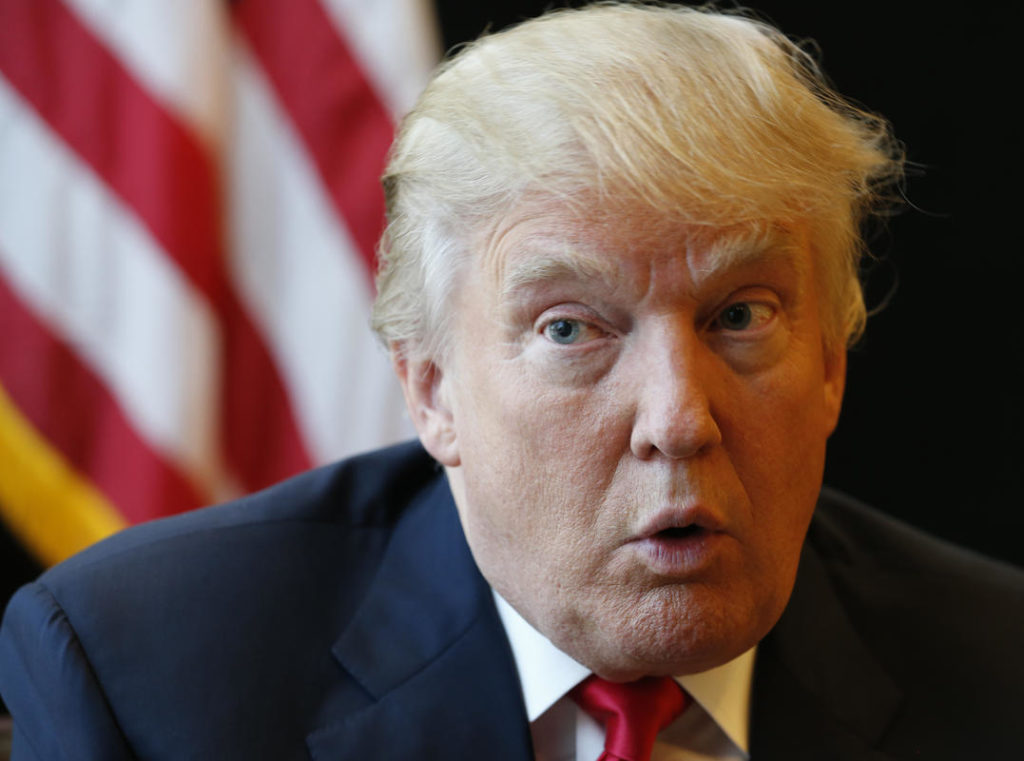
For the first time since declaring his presidential run, Republican Donald Trump offered an extended apology to those who may have been hurt by his caustic comments, saying that he regrets some of what he’s said “in the heat of debate.” “Sometimes in the heat of debate and speaking on a multitude of issues, you don’t choose the right words or you say the wrong thing. I have done that,” the GOP nominee reading from prepared text, said at a rally in Charlotte, N.C. “And believe it or not, I regret it, particularly where it may have caused personal pain.” He added: “Too much is at stake for us to be consumed with these issues.” As the crowd cheered, Trump pledged to “always tell you the truth.” The remarks came as Trump makes significant changes to a campaign that has struggled since the Democratic and Republican nominating conventions from self-created distractions. Earlier Thursday, Trump moved to invest nearly $5 million in battleground state advertising to address daunting challenges in the states that will make or break his White House ambitions. He also shook up his campaign in recent days, tapping a combative conservative media executive, Stephen Bannon, to serve as CEO of the campaign. The New York businessman’s campaign reserved television ad space over the coming 10 days in Florida, North Carolina, Ohio and Pennsylvania, according to Kantar Media’s political ad tracker. While Democrat Hillary Clinton has spent more than $75 million on advertising in 10 states since locking up her party’s nomination, Trump’s new investment marks his first of the general election season. Election Day is 81 days away, with early voting in the first states set to begin in five weeks. The step into swing-state advertising, which came after Trump’s second staffing shake-up in as many months, did little to alleviate the concerns of Republican officials frustrated with Trump’s refusal to adopt the tools of modern-day political campaigns. “We may have reached the point of no return for Donald Trump,” said Republican strategist Alex Conant, a senior aide to Florida Sen. Marco Rubio‘s presidential campaign. In addition to Bannon, Republican pollster Kellyanne Conway filled the campaign manager position left vacant since Trump fired his former campaign chief almost two months ago. But Trump struck a new, inclusive tone on Thursday, as he worked to improve his dismal poll numbers among non-white voters. “I will not rest until children of every color in this country are fully included in the American Dream,” he said. Conway insisted Thursday that the new team would help re-focus the nominee, without sacrificing the authenticity that fueled his successful primary campaign. “We’re going to sharpen the message,” Conway told CNN. “We’re going to make sure Donald Trump is comfortable about being in his own skin — that he doesn’t lose that authenticity that you simply can’t buy and a pollster can’t give you. Voters know if you’re comfortable in your own skin.” Rarely do presidential campaigns wait to advertise, or undergo such leadership tumult, at such a late stage of the general election. Yet Trump has struggled badly in recent weeks to offer voters a consistent message, overshadowing formal policy speeches with a steady stream of self-created controversies, including a public feud with an American Muslim family whose son was killed while serving in the U.S. military in Iraq. He now trails Clinton in preference polls of most key battleground states. And his party leaders, even at the Republican National Committee, have already conceded they may divert resources away from the presidential contest in favor of vulnerable Senate and House candidates if things don’t improve. Trump’s advertising plans highlight his shrinking path to the presidency. Although Trump claims his popularity with white, working-class voters could translate to victories in states such as Wisconsin, Michigan, Maine or Connecticut, there’s little evidence to back that up. His first major ad buys shows him focused on more conventional battlegrounds. Trump is spending at least $1.4 million in Florida, $1 million in Pennsylvania, about $831,000 in North Carolina and $746,000 in Ohio, according to Kantar Media. His biggest single-market investment comes in the Philadelphia area. “That is the most direct route to 270,” said Chris Young, RNC field director. “Those states are critical on that pathway.” Trump has struggled so far with women, minorities and young voters. “His performance with those voters is so dismal that it puts other states potentially in play in an offensive way for Democrats,” said Jeremy Bird, who ran field operations for President Barack Obama‘s 2012 campaign and is now advising Clinton’s operation. Republished with permission of the Associated Press.
State lottery bill fails in special session
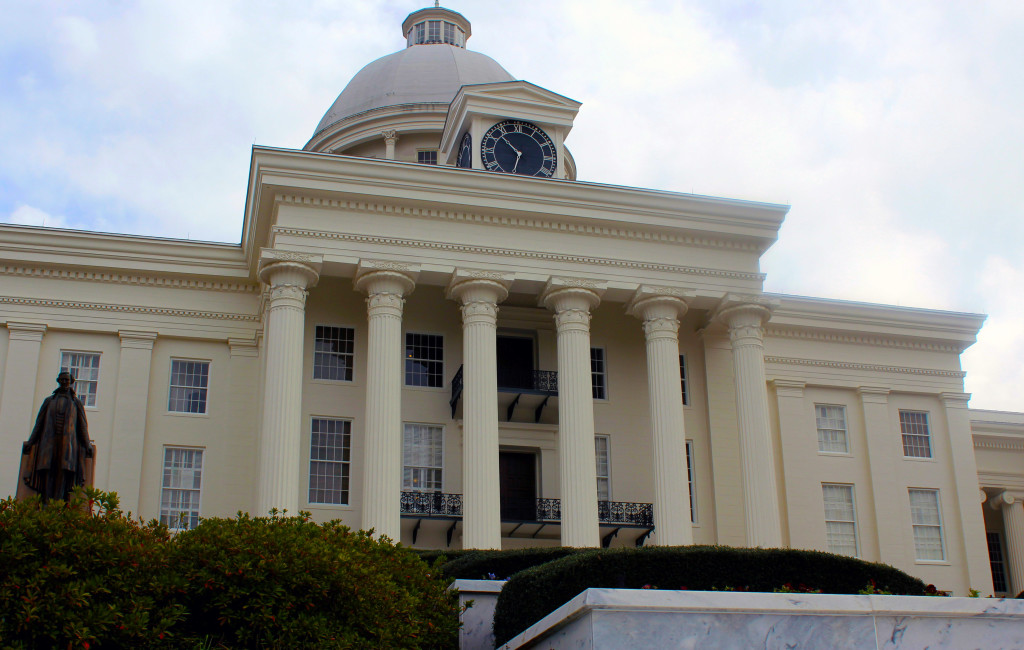
State senators have punted a vote of a lottery bill after a test vote indicated it did not have the votes to pass. Senators stopped discussions Thursday on the bill over after a motion to end debate failed. Senate President Del Marsh said it became obvious that senators did not like the legislation. The bill would have also allowed electronic lottery terminals, which can resemble slot machines and video poker games, in Lowndes and Houston counties, in addition to four state dog tracks. Sen. Jim McClendon accepted changes to his original bill in an effort to get the stalled legislation through the Alabama Senate. Alabama voters must approve any lottery proposal. Republished with permission of the Associated Press.
Alabama House approves BP oil spill settlement split
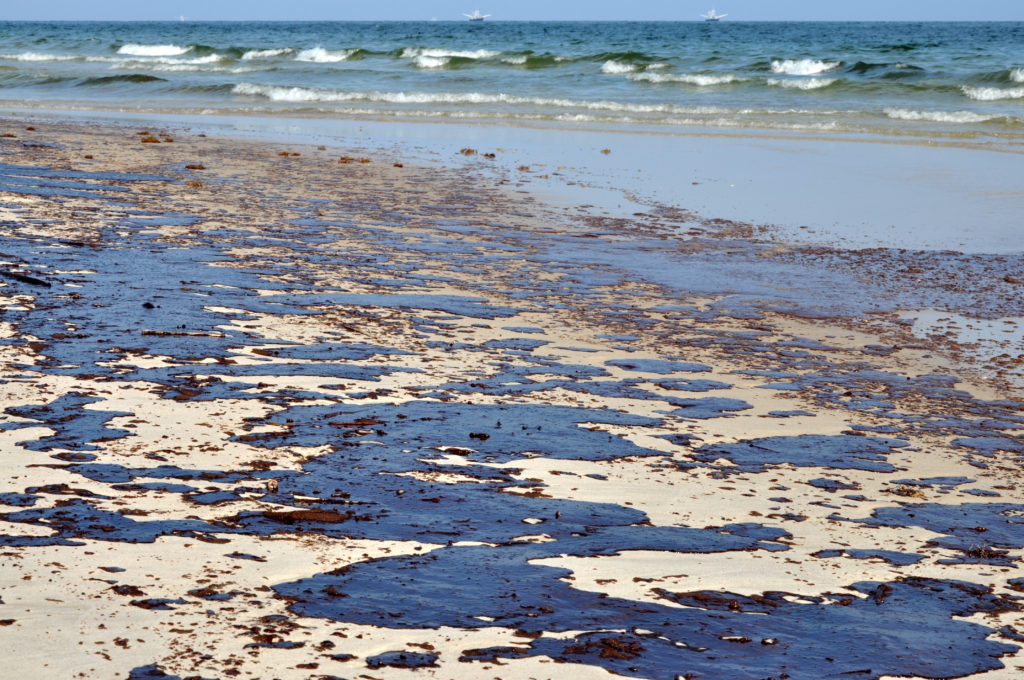
The Alabama House of Representatives cleared a major hurdle Thursday, approving a bill to use the state’s settlement funds from the 2010 Deepwater Horizon BP oil spill in the Gulf of Mexico to pay debts and build roads in south Alabama. Lawmakers approved the bill 88-10. The plan, devised primarily by Ozark Republican and Committee Chairman Steve Clouse, calls for the state to create a $639 million bond issue and apply the BP payments to pay off the bonds. Under the plan, $450 million of the settlement would be used for debt repayment and nearly $200 million would go toward road projects in coastal counties. The bill now moves to the Alabama Senate.
Donald Trump makes first ad buys in battleground states, including Florida
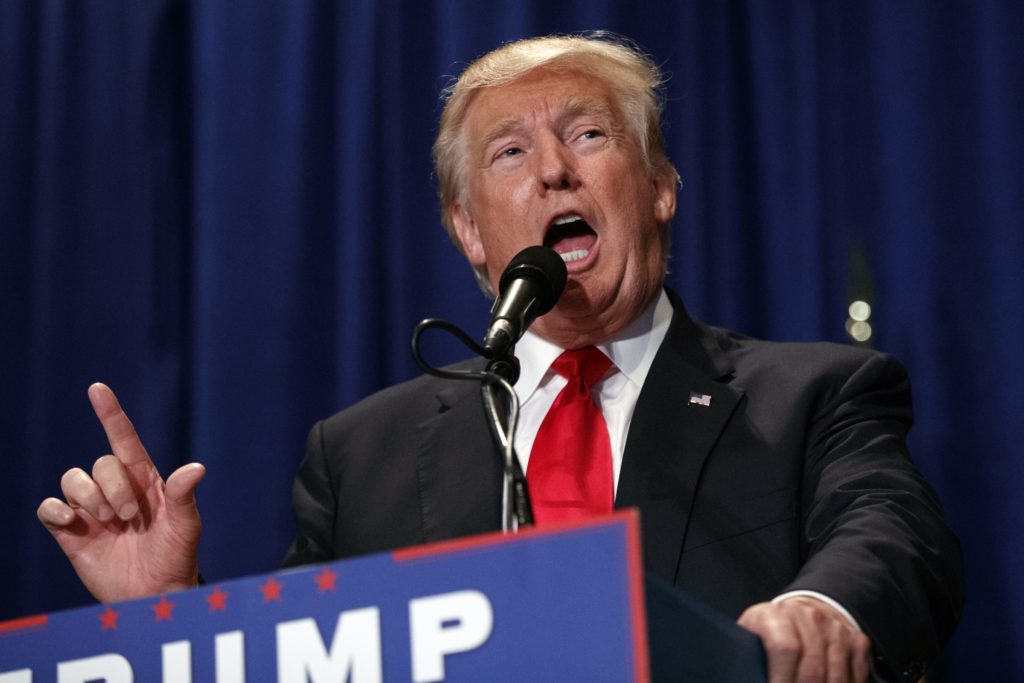
With his new leadership team promising a sharper message, Donald Trump on Thursday moved to invest nearly $5 million in battleground state advertising. The investment over the coming 10 days in Florida, North Carolina, Ohio and Pennsylvania marks the Republican presidential contender’s first major general election expenditures in the swing states, which are considered critical to his narrowing path to the White House. The advertising plans, confirmed by Kantar Media’s political ad tracker, come a day after Trump announced another senior staffing shakeup. Weary Republican leaders hope the new leadership team can reverse the New York businessman’s struggles even as some worry it’s too little too late. The Republican nominee tapped Stephen Bannon — a combative conservative media executive with no presidential campaign experience — to serve as CEO of his White House bid. Pollster Kellyanne Conway, who has known Trump for years and gained his trust during her brief tenure working for him, will serve as campaign manager. “I think we’re going to sharpen the message,” Conway told CNN. “We’re going to make sure Donald Trump is comfortable about being in his own skin — that he doesn’t lose that authenticity that you simply can’t buy and a pollster can’t give you. Voters know if you’re comfortable in your own skin.” The Republican National Committee has already conceded it may divert resources away from the presidential contest favor of vulnerable Senate and House candidates if Trump’s standing does not improve in the coming weeks. RNC chief strategist Sean Spicer called Trump’s staffing changes the “healthy growth of the campaign at a senior level at a key point.” He also urged caution as Trump’s new team contemplates whether the fiery populism and freewheeling style that won him the Republican nomination will give him a better shot at the White House than uniting his party and rallying moderate voters. “I think people want him to be authentic,” Spicer said. “They appreciate he’s not a scripted politician, but there’s a recognition that words do matter.” The staffing changes are aimed in part at marginalizing campaign chairman Paul Manafort, a longtime Republican operative who pushed Trump to moderate his tone and improve relations with skeptical Republican officials. In breaking with that approach, Trump appears set on finishing the race on his own terms — win or lose. Trump’s divisive tone and weak poll numbers have triggered a rash of Republican defections in recent weeks. Party loyalists have grown increasingly frustrated with Trump’s inability to stay focused on Democrat Hillary Clinton amid a series of self-created distractions. “I don’t care if Donald Duck is running the campaign,” said Henry Barbour, a Republican National committeeman from Mississippi. “If he can make this thing about Hillary Clinton’s record and getting the country back on track, that’s what’s going to win this election.” Despite the new advertising investment, Trump is woefully behind: Clinton’s campaign has spent more than $75 million on ads in the weeks since she effectively locked up the nomination in early June, according to Kantar Media’s political ad tracker. Trump frequently boasts that his rival is spending heavily while he’s put nothing into advertising, banking so far on free wall-to-wall media coverage to carry his message. While his campaign has been silent through paid media, he’s had some assistance from outside political groups, Kantar Media shows. One, called Rebuilding America Now, has spent about $9 million in the past few weeks. The National Rifle Association’s political arm has also put more than $4 million into anti-Clinton messages. But these amounts pale in comparison to the $31 million the pro-Clinton super PAC Priorities USA has spent on air since mid-June. And that’s just one of several groups helping her. Rarely do presidential campaigns wait so long to advertise, or undergo such a level of leadership tumult at such a stage of the general election. The developments come less than three months before Election Day, and roughly six weeks before early voting begins. Trump’s standing in the White House race plummeted throughout the summer and he now trails Clinton in preference polls of most key battleground states. He’s struggled to offer voters a consistent message, overshadowing formal policy speeches with a steady stream of controversies, including a public feud with an American Muslim family whose son was killed while serving in the U.S. military in Iraq. Bannon’s website has been fiercely loyal to Trump for months and sharply critical of Republican leaders, including House Speaker Paul Ryan. Breitbart has also actively promoted false conspiracy theories about Clinton, and some have then made their way into Trump’s remarks. “Trump is on his third campaign manager in three months. If this was a hot dog stand, conclusion might be there was a problem with the dogs,” Republican strategist Stuart Stevens, a frequent Trump critic, wrote on Twitter. Republished with permission of the Associated Press. Republished with permission of the Associated Press.
Donald Trump makes first battleground state ad buys
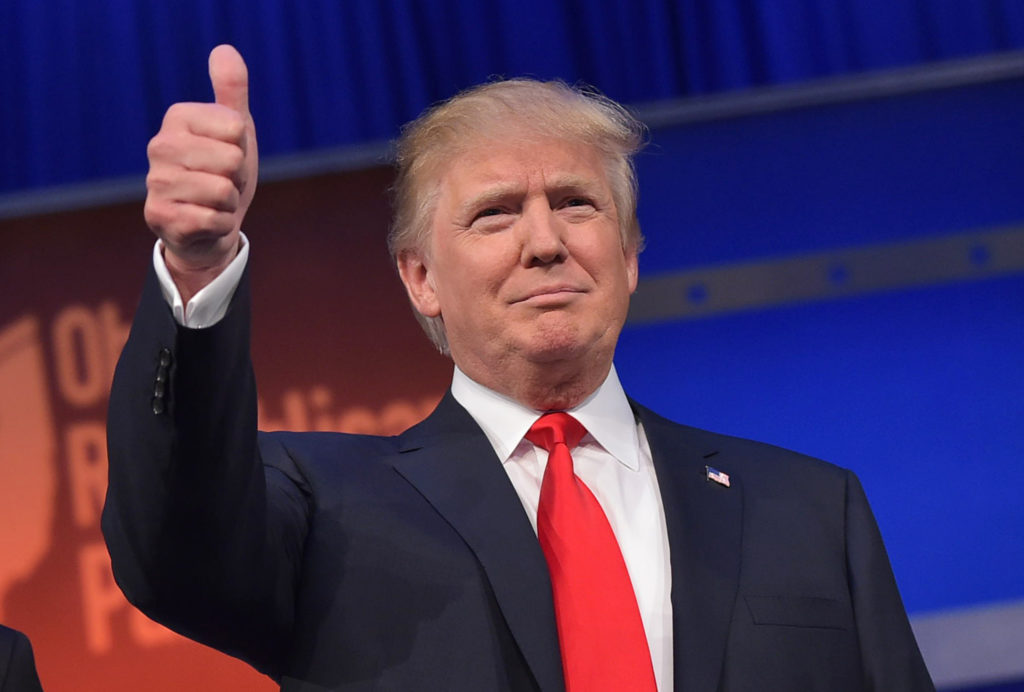
With his new leadership team promising a sharper message, Donald Trump on Thursday moved to invest nearly $5 million in battleground state advertising. The investment over the coming 10 days in Florida, North Carolina, Ohio and Pennsylvania marks the Republican presidential contender’s first major general election expenditures in the swing states, which are considered critical to his narrowing path to the White House. The advertising plans, confirmed by Kantar Media’s political ad tracker, come a day after Trump announced another senior staffing shakeup. Weary Republican leaders hope the new leadership team can reverse the New York businessman’s struggles even as some worry it’s too little too late. The Republican nominee tapped Stephen Bannon – a combative conservative media executive with no presidential campaign experience – to serve as CEO of his White House bid. Pollster Kellyanne Conway, who has known Trump for years and gained his trust during her brief tenure working for him, will serve as campaign manager. “I think we’re going to sharpen the message,” Conway told CNN. “We’re going to make sure Donald Trump is comfortable about being in his own skin – that he doesn’t lose that authenticity that you simply can’t buy and a pollster can’t give you. Voters know if you’re comfortable in your own skin.” The Republican National Committee has already conceded it may divert resources away from the presidential contest favor of vulnerable Senate and House candidates if Trump’s standing does not improve in the coming weeks. RNC chief strategist Sean Spicer called Trump’s staffing changes the “healthy growth of the campaign at a senior level at a key point.” He also urged caution as Trump’s new team contemplates whether the fiery populism and freewheeling style that won him the Republican nomination will give him a better shot at the White House than uniting his party and rallying moderate voters. “I think people want him to be authentic,” Spicer said. “They appreciate he’s not a scripted politician, but there’s a recognition that words do matter.” The staffing changes are aimed in part at marginalizing campaign chairman Paul Manafort, a longtime Republican operative who pushed Trump to moderate his tone and improve relations with skeptical Republican officials. In breaking with that approach, Trump appears set on finishing the race on his own terms – win or lose. Trump’s divisive tone and weak poll numbers have triggered a rash of Republican defections in recent weeks. Party loyalists have grown increasingly frustrated with Trump’s inability to stay focused on Democrat Hillary Clinton amid a series of self-created distractions. “I don’t care if Donald Duck is running the campaign,” said Henry Barbour, a Republican National committeeman from Mississippi. “If he can make this thing about Hillary Clinton‘s record and getting the country back on track, that’s what’s going to win this election.” Despite the new advertising investment, Trump is woefully behind: Clinton’s campaign has spent more than $75 million on ads in the weeks since she effectively locked up the nomination in early June, according to Kantar Media’s political ad tracker. Trump frequently boasts that his rival is spending heavily while he’s put nothing into advertising, banking so far on free wall-to-wall media coverage to carry his message. While his campaign has been silent through paid media, he’s had some assistance from outside political groups, Kantar Media shows. One, called Rebuilding America Now, has spent about $9 million in the past few weeks. The National Rifle Association‘s political arm has also put more than $4 million into anti-Clinton messages. But these amounts pale in comparison to the $31 million the pro-Clinton super PAC Priorities USA has spent on air since mid-June. And that’s just one of several groups helping her. Rarely do presidential campaigns wait so long to advertise, or undergo such a level of leadership tumult at such a stage of the general election. The developments come less than three months before Election Day, and roughly six weeks before early voting begins. Trump’s standing in the White House race plummeted throughout the summer and he now trails Clinton in preference polls of most key battleground states. He’s struggled to offer voters a consistent message, overshadowing formal policy speeches with a steady stream of controversies, including a public feud with an American Muslim family whose son was killed while serving in the U.S. military in Iraq. Bannon’s website has been fiercely loyal to Trump for months and sharply critical of Republican leaders, including House Speaker Paul Ryan. Breitbart has also actively promoted false conspiracy theories about Clinton, and some have then made their way into Trump’s remarks. “Trump is on his third campaign manager in three months. If this was a hot dog stand, conclusion might be there was a problem with the dogs,” Republican strategist Stuart Stevens, a frequent Trump critic, wrote on Twitter. Republished with permission of the Associated Press.
Former Alabama Secretary of State Jim Bennett dies at 76
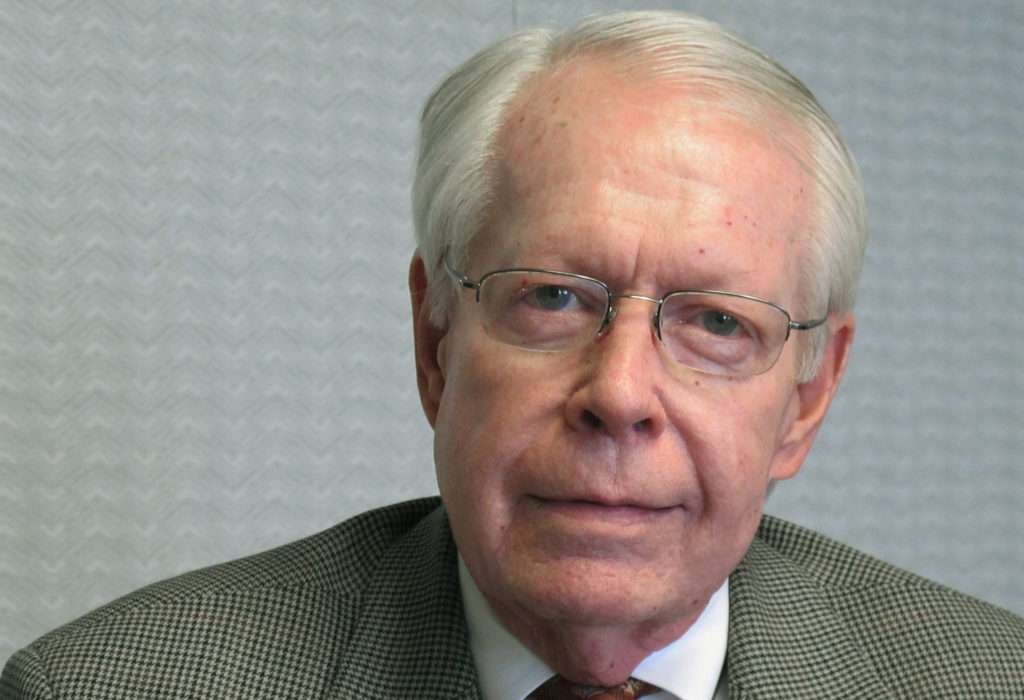
Four-time Alabama Secretary of State Jim Bennett lost his battle to cancer Wednesday night. He was 76. Bennett’s death was announced Thursday by Jacksonville State University, where he served as chairman of the board of trustees. Thursday morning, the Alabama Senate paused their work on a state lottery bill to honor Bennett with a moment of silence. “You talk about a man who did well in everything he did,” said Bessemer Democratic state Sen. Priscilla Dunn on the floor of the Alabama Senate Thursday morning. “He was an honest man and he was always there for me.” Alabaster Republican Cam Ward echoed Dunn’s praise. “Jim had a way — it’s a bygone era of being a calm, deliberative voice even when things went crazy. He was just a sound voice.” Born in Iowa and raised in Tennessee, Bennett worked as reporter for the Birmingham Post-Herald after graduating Jacksonville State University in 1961 where he covered civil rights protests in Birmingham in the 1960s. Following his years as a journalist, Bennett was elected to the Alabama Legislature in 1978 and later served four terms as secretary of state by appointment or election. Gov. Robert Bentley said Bennett’s legacy and memory will live on for years. “Alabama has lost a wonderful leader and true public servant,” Bentley said in a release. “On Monday, I visited Jim and awarded him the Governor’s Cross in recognition of his unselfish service to Alabama. This is an Alabama National Guard medal, and it is highest honor that can be bestowed by the Guard. Jim was a dedicated public servant for many decades who truly cared for the people of Alabama. I know his legacy, and his memory will live on for years to come.” Current Alabama Secretary of State John Merrill said there are very few who have contributed as much to Alabama as Bennett, describing him as a “friend and mentor.” “Secretary Bennett contributed extensively to the betterment of the entire state of Alabama as he dedicated his life to the service of the people,” Merrill said. “He was one of those who helped me as an up-and-coming young person who hoped to be involved in Alabama politics. He always had time for me. He always had time to answer my questions and to offer a kind and supporting word. He was that way for everyone, not just me.” A Republican, Bennett last left the office in 2015, when he retired and was honored with a Capitol ceremony. Bennett is survived by his wife Andrea and two children.
Steven Kurlander: Debating debatable debates
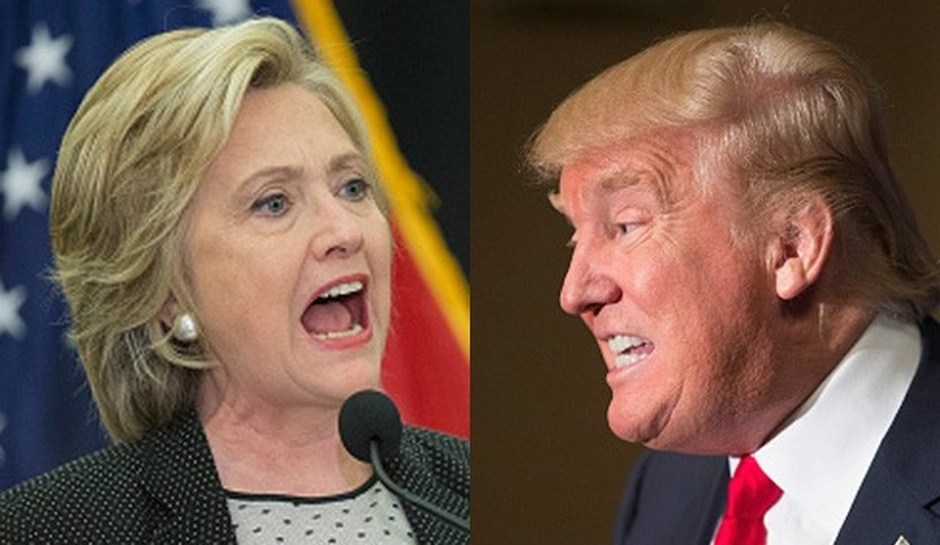
In 21st century American politics, it’s a given that if you are running for office, you should expect to debate your opponent(s) during the campaign — no matter whether you are running for school board or president. Debating your opponent is part of proving your mettle for the job you are running for. Normally, it’s not a good move for a candidate not to show up to debate your opponent. Bob Greene wrote in 2012 “Today debates between the candidates — even when one of them is the incumbent — are all but mandatory. A candidate would be seen as chicken for not agreeing to debate. “ It appears that Donald Trump may think otherwise. He set off a controversial debate about the presidential debates themselves when first tweeted he was debating skipping the three upcoming presidential debates, which are set up by the “nonpartisan, nonprofit” Commission on Presidential Debates. CNN’s Rachel Sklar wrote: “Donald Trump is complaining. Of course, that’s nothing new — the notoriously thin-skinned Republican nominee is an inveterate pouter, openly sulking about perceived injustices like lawsuits presided over by “Mexican” judges, accurate press coverage and Megyn Kelly being mean to him. At 70, he may be the grumpiest old man on Twitter.” A visit to any American retirement community would confirm that grumpy, thin-skinned old men don’t like to debate anything, let alone the political issues of the day. But in this day and age of social media, a 24-hour news cycle, and an American electorate already inundated with instantaneous presidential election news, Trump may be right to question the antiquated formats of these debates and particularly the moderators who nowadays show no semblance of neutrality at these events. In 2016, if you ask Americans whether they rather tune into a presidential debate between Hillary and Donald or an NFL game being broadcast at the same time, it’s easy to predict that they’d rather eat their Doritos and wings watching football. Political debates used to carry the aura of significance in terms of having great impact on elections and how voters decide who to vote for. Students of history were taught of the impact on American history of the infamous seven Lincoln-Douglas debates in 1858 Illinois Senate campaign and the Nixon-Kennedy debates of the 1960s. But since the Nixon-Kennedy debates, presidential debates have devolved in terms of their quality of political discourse, their fairness in how they are conducted and their true impact on voters. The true question is not whether Trump should debate or not, but whether the upcoming presidential debates carry any significance at all. At this point, most Americans are voting against, not for, either Clinton or Trump. They both carry big negatives among American voters. The debates, no matter what is said, won’t matter in this regard. Americans also have been already subjected to 13 GOP presidential primary debates and 10 Democratic presidential primary debates, and most of those debates, particularly the Republican ones, already proved trivial in dialogue and insignificant in terms of affecting how voters cast their ballots in the primaries. Given all this, aside from being called a chicken by the mainstream press that despises him anyway, Trump has nothing to lose by refusing to debate Hillary Clinton. There’s only one way the upcoming three presidential debates can change voters’ minds, and that’s if third party candidates can participate in them. The Commission on Presidential Debates right now doesn’t allow third party candidates to participate in the debates unless they reach a 15 percent polling threshold in five polls among voters. If Gary Johnson of the Libertarian Party or Jill Stein of the Green Party were allowed to take the stage with Clinton and Trump, then there’s no debating that these debates would suddenly become very significant in the 2016 race. Allowing Johnson and Stein on the debate platform on three occasions would guarantee that Americans would hear some serious political discussion (that they crave at this point) — and that a third-party candidate could have a serious impact on the race, or even win the White House. This is not debatable: If Johnson and/or Stein take the stage, a serious Donald Trump would definitely show up and the presidential debates for the first time in decades would be a truly historical event. ___ Steven Kurlander blogs at Kurly’s Kommentary. He is a communications strategist and an attorney in Monticello, New York, writes for Florida Politics and is a former columnist for the South Florida Sun-Sentinel. He can be emailed at kurly@stevenkurlander.com.
Daniel Sutter: Did John D. Rockefeller lose money to make millions?
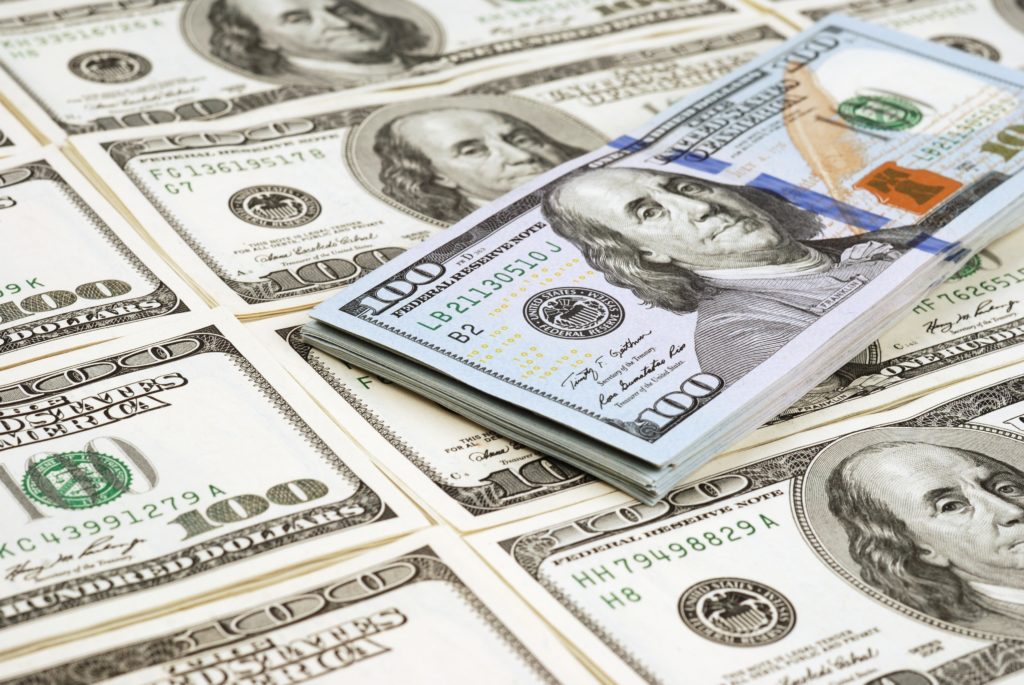
In 1911 the U.S. Supreme Court broke up John D. Rockefeller’s Standard Oil Company in America’s most famous antitrust case. One legacy of the case involves predatory pricing, or selling below cost to bankrupt rivals, which Standard Oil allegedly used to attain its dominant position in refining. The record, however, shows otherwise. Predatory pricing is essentially an economics urban legend. Before turning to the history, note that predatory pricing necessarily involves selling below cost. If lower costs let Standard Oil sell profitably at a price where competitors lost money, this would not be predatory pricing. The tactic involves losing money now to drive smaller rivals out of business and earn larger future profits as a monopoly. Fear of predatory pricing affects public policy and popular opinion today, making the history relevant. The antitrust cases against Microsoft in the 1990s included charges of predatory actions with its Internet Explorer web browser. In addition to Federal antitrust law, more than twenty states prohibit sales below cost generally, with several more, including Alabama, doing so just for gasoline. States generally have a lower standard of evidence, and so state courts hear most predatory pricing claims today. Fear of predatory behavior, I think, lies behind many concerns about unfair international competition. Suppose China subsidizes exports to the U.S.; Chinese firms might sell us something that cost $10 to produce for $6. I would say we receive a $4 gift with each purchase, and should remember to send a thank you note. But what happens after this “generosity” drives American companies out of business? Won’t the Chinese then sell us this same item for $20? Perhaps, especially if you view the initial low price as predatory. We fear predatory pricing because it allegedly built Standard Oil and the Rockefeller fortune. According to the popular narrative, Standard used predatory pricing and “struck down its competitors, in one market at a time, until it enjoyed a monopoly position everywhere.” Only the story doesn’t square with the facts. In a classic 1958 paper, economist John McGee reviewed the evidence in the government’s antitrust case against Standard Oil, over 13,000 pages of transcripts, briefs, and exhibits. Standard bought out over 100 refineries, and by 1890 was refining almost 90 percent of America’s oil. But Professor McGee found no evidence of predatory price cutting by Standard. Furthermore, rivals received good prices for their refineries and the owners often then worked for Standard. Several even started new refineries, which would be like running back into a burning building if they felt that they had been ruined by predatory competition. The record shows that Standard Oil dominated refining by lowering costs. And Americans benefitted: the price of refined petroleum fell from 30 cents a gallon in 1869 to 6 cents in 1897. The Standard Oil case does not surprise economists able to see the two major logical flaws of predatory pricing. First, selling below cost penalizes large firms more than their smaller rivals. Taking a $1 per unit loss is more costly when you sell 60% of the market than 6%. Second, new firms can typically jump in when a monopolist tries raising the price to recoup their losses. Rivals bought out once can even reenter the competition, as happened to Rockefeller. And the knowledge of how to build refineries (or make other products) still exists, allowing other new entrants. Unless some factor made starting new businesses particularly hard, what economists call barriers to entry, new competitors will quickly undercut a high price. The huge profits to make up for the losses from selling below cost will remain out of reach, like a mirage. Predatory pricing is a mythical beast. But this boogeyman continues to justify Federal and state laws allowing businesses to sue firms that cut prices. Lower prices based on lower costs benefit consumers and the economy and should be incentivized, not penalized. Businesses unable to keep up on the field of market competition should not be able to harass more efficient rivals in the courtroom. ••• Daniel Sutter is the Charles G. Koch Professor of Economics with the Manuel H. Johnson Center for Political Economy at Troy University and host of Econversations on TrojanVision. The opinions expressed in this column are the author’s alone and do not necessarily reflect the views of Troy University.
ADPH confirms 25 cases of Zika virus in 16 Alabama counties

The Alabama Department of Public Health (ADPH) reports there have been a total of 25 confirmed, travel-related Zika virus cases across the Yellowhammer State as of 8 a.m. Aug. 15. Residents in 16 counties — Calhoun, Cullman, Etowah, Houston, Jefferson, Lawrence, Lee, Limestone, Madison, Mobile, Montgomery, Morgan, Shelby, St. Clair, Talladega and Tuscaloosa — have tested it positive for the virus. “We have been working with a variety of partners, including the Centers for Disease Control and Prevention (CDC) and the medical community, to identify individuals who need to be tested for the Zika virus and with those who have tested positive,” State Health Officer Dr. Tom Miller said in a press release. “Additional precautions are needed for pregnant women and women of childbearing age. Public health environmentalists have been helping communities reduce mosquito breeding grounds around their homes and communities.” ADPH shared several tips on how to best protect yourself from mosquitoes and Zika virus: Wear long-sleeved shirts and long pants Stay and sleep in places with air conditioning or window and door screens Remove standing water Wear an Environmental Protection Agency-registered repellent Zika virus is transmitted primarily through the bites of Aedes species mosquitoes and through sexual activity. Zika infection during pregnancy can cause a serious birth defect called microcephaly that is a sign of incomplete brain development. Doctors have also found other problems in pregnancies and among fetuses and infants infected with Zika virus before birth. Currently, there is no vaccine or medicine for Zika. People infected with the Zika virus may have no symptoms, as it causes only mild symptoms in one out of five people. People usually do not get sick enough to go to the hospital, and they very rarely die of Zika. For this reason, many people might not realize they have been infected. Alabama health officials say pregnant women should not travel to Zika-affected areas. “If a pregnant woman must travel to one of these areas, she should discuss the trip with her healthcare provider first and strictly follow steps to prevent mosquito bites during her travel.”
Donald Trump receives first classified intelligence briefing
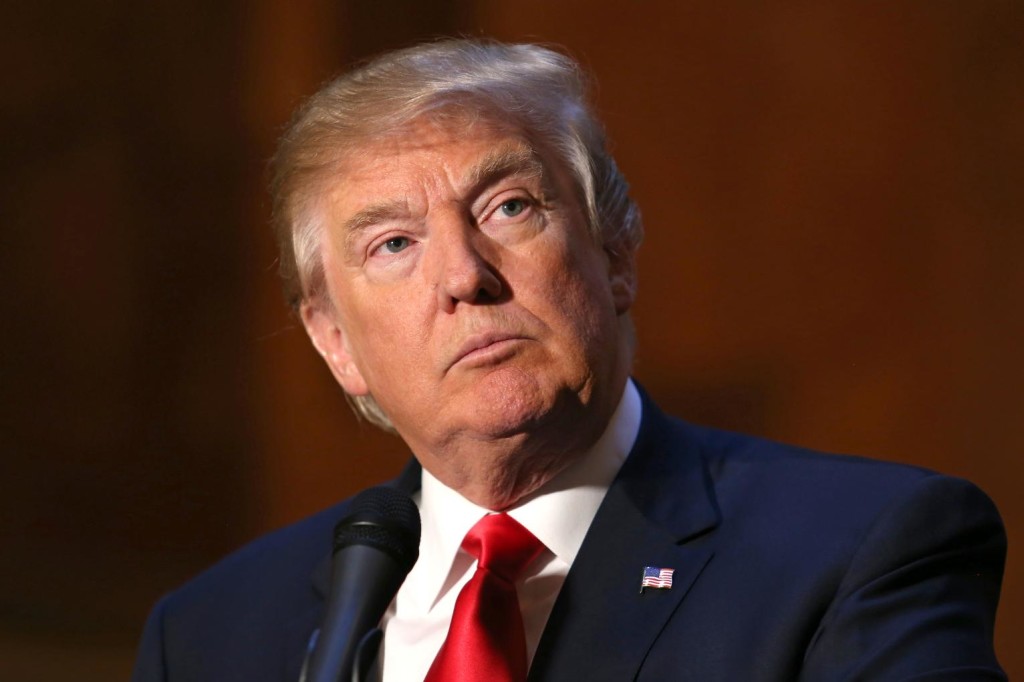
Donald Trump has received his first classified intelligence briefing, meeting with national security officials for more than two hours on Wednesday. The celebrity businessman became entitled to the briefings once he officially became the Republican nominee for president. The briefing was delivered by career staffers from the Office of the Director of National Intelligence and was expected to cover major threats and emerging concerns around the world. The afternoon briefing was held at an FBI field office at a federal building in New York City, a facility which has the secure rooms required for such sensitive briefings. Trump did not speak to reporters upon entering or exiting the building and a campaign spokeswoman did not immediately respond to a request for comment about the briefing. But Trump, in an interview that aired just hours before the briefing, suggested he would be skeptical of its contents when he was asked if he trusted the nation’s intelligence materials. “Not so much from the people that have been doing it for our country,” Trump told Fox News. “I mean, look what’s happened over the last 10 years…it’s been catastrophic.” Trump brought along some top advisers, including New Jersey Gov. Chris Christie and Lt. Gen. Michael Flynn, to the briefing. A U.S. intelligence official said that generally, advisers who attend the briefings must have appropriate security clearances. The official spoke on condition of anonymity because he wasn’t authorized to disclose information about the candidates’ intelligence briefings. Defense Intelligence Agency says that the agency maintains security clearances for all its former directors, including Flynn, who served in the post from 2012-2014. The briefing came two days after Trump delivered a speech on national security and just hours after he gathered several advisers for a security round table at Trump Tower. The advisers, including former New York City Mayor Rudy Giuliani, encouraged the GOP nominee to press for more surveillance and more information-sharing with local police departments to fight terror threats if he’s elected president. The FBI does share with local police agencies through Joint Terrorism Task Forces. It wasn’t clear whether Democrat Hillary Rodham Clinton has received an intelligence briefing. Republished with permission of the Associated Press.
Hillary Clinton meeting with top law enforcement leaders in New York
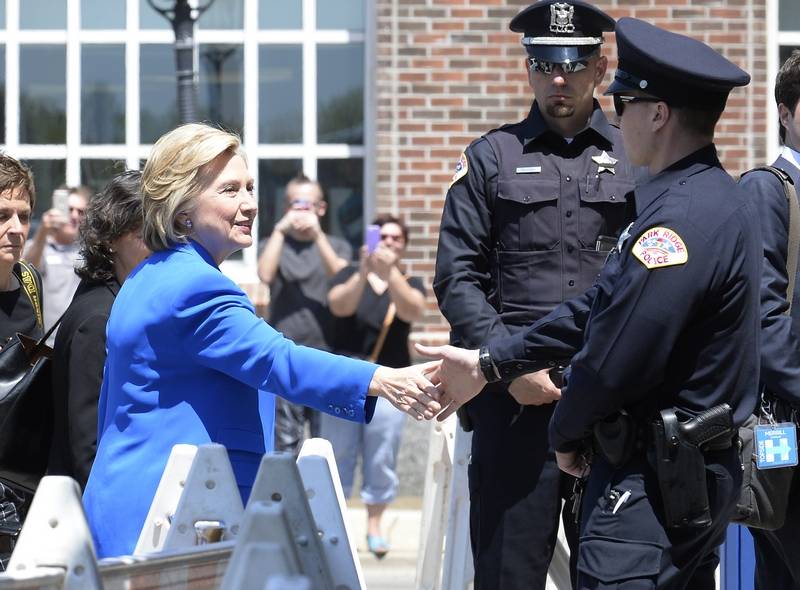
Hillary Clinton is poised to meet Thursday with a group of top law enforcement leaders, including the retiring New York City police commissioner who recently said Donald Trump‘s presidential candidacy scared him. Clinton campaign aides said she will meet in New York with eight leading law enforcement leaders, including retiring commissioner Bill Bratton of New York City and his successor, James O’Neill; Charles Beck of the Los Angeles Police Department and former police chief Charles Ramsey of Philadelphia. Other participants include law enforcement leaders from Tucson, Arizona; Seattle; Camden County, New Jersey; and Dallas County, Texas. Bratton said in an interview earlier this month with CBS News that Trump’s “shoot from the hip” style and “lack of depth” on policy issues scared him. Clinton’s meeting comes as Trump, the Republican nominee, has accused her of being “against the police” and vowed to restore law and order if elected president. Aides said Clinton’s meeting had been planned for several weeks and would build upon her outreach to law enforcement during the campaign. Following a deadly shooting of police officers in Dallas, Clinton urged Americans to try to walk in the shoes of law enforcement and Democrats had law enforcement officials speak at their summer convention, including Ramsey. Republished with permission of the Associated Press.


